Roland Yeomans's Blog, page 75
July 30, 2019
Mankind Shares A Soundtrack
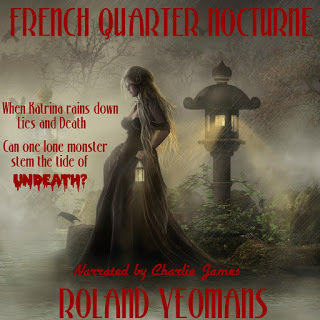
Mankind shares a soundtrack.
Science assures us of that.
Experts in all fields are singing the same tune.
Anthropologists, evolutionary biologists, neurosurgeons, and psychologists
have all come to the same conclusion while taking different paths to reach it.
They believe the "musical" area in the brain created human nature.
 Music is as universal as language.
Music is as universal as language. It predates agriculture.
Some scientists believe it even existed before language,
its melodies promoting the cognitive development necessary for speech.

Americans spend more money on music than they do on prescription drugs or sex.
The average American spends more than five hours a day listening to it.

Obviously, it is important to us.
It is important to FRENCH QUARTER NOCTURNE as well.
https://www.amazon.com/dp/1511548207/
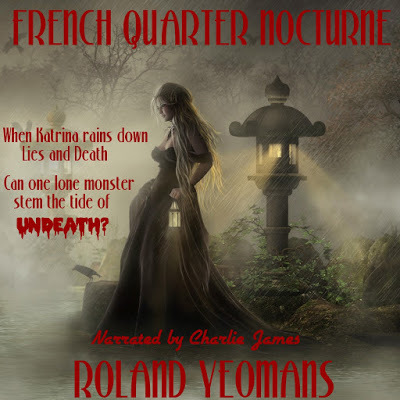
And with a title like that that, it should come as no surprise.
It is important to the lead character, Samuel McCord, too.

It is no coincidence that he owns a jazz club. A jazz club he named after his wife, Meilori.
Music to him has become a remembrance of shadows, an echo of times spent with friends, and a glimpse into a time when he was loved.

He is a monster who mourns the loss of his humanity.
So much so that he nutures it in the souls of those who enter his club, lost and hungry.
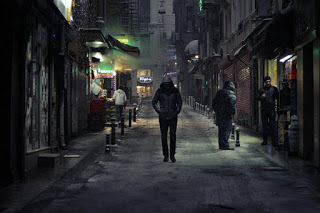
McCord sees life in terms of music.
When he first views the flooded streets of New Orleans, he hears Bette Midler singing,
"I think It's Going To Rain Today," especially the refrain "human kindness is overflowing."
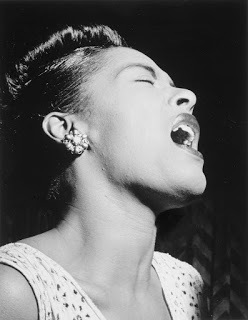
He championed the tragic jazz legend, Billie Holiday. His wife's favorite song was Billie's "You Go To My Head."

He often hears it throughout the novel.
And when he is facing his death before overwhelming odds,
he once again hears that song before murmuring the one name he promised himself would be the last on his lips:
"Meilori."
Here is the Canadian legend, Diana Krall, singing YOU GO TO MY HEAD:
{I like to think of this video as Diana rehearsing in the smoky haze of Meilori's.}
Published on July 30, 2019 11:49
July 29, 2019
WHAT IS LIFE?

In 1890 in his book The Principles of Psychology, Vol.1, William James
wrote a simple statement that is packed with meaning:
“My experience is what I agree to attend to.”

In this age when distraction is but a thumb swipe away, it has never been harder tokeep our attention intentional instead of reactive.
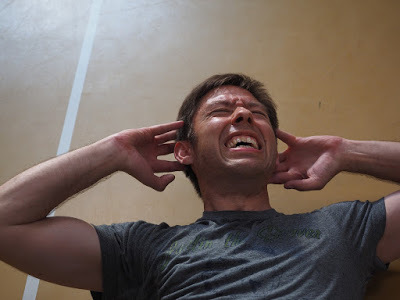
We are living through an Epidemic of Overwhelm.
The New York Times on Sunday contains more information
than the average 18th century French Nobleman learned in his lifetime.
But it is more than that.

We grew up believing who we are is what our parents think about us,
so it is natural to seek affirmation from others through social media.

Believing that connection is something outside of yourself causes you to be disconnected.

Life is all around us. It is what we choose to see in it that shapes our lives.

Up to a point a person’s life is shaped by environment, heredity, and changes in the world about them.
Then there comes a time when it lies within their grasp
to shape the clay of their life into the sort of thing they wish it to be.
Only the unwise blame parents, their race, their times, lack of good fortune or the quirks of fate.
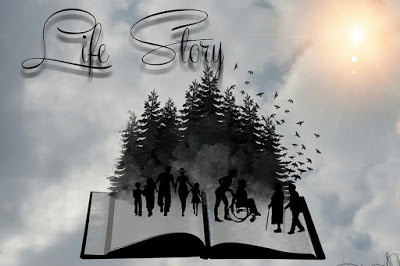
Everyone has the power to say, "This I am today. That I shall be tomorrow.
To have a goal is the important thing,
and to work towards it.
Then, if you decide you wish
to do something different,
You will at least have been moving,
You will have been going somewhere,
You will have been learning.
What do you think?
Published on July 29, 2019 22:00
July 28, 2019
What Happened to Our Dreams?
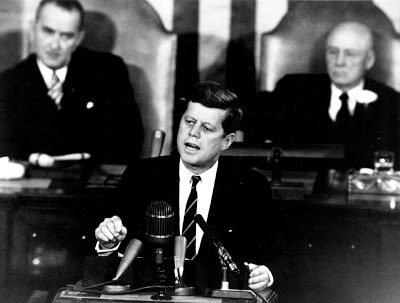 "Ask not what your country can do for you;
ask what you can do for your country."
- John F. Kennedy's Inaugural Address, January 20, 1961
"Ask not what your country can do for you;
ask what you can do for your country."
- John F. Kennedy's Inaugural Address, January 20, 1961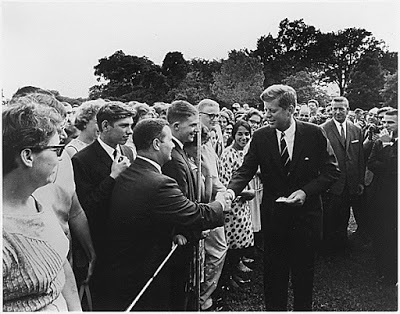
“We pledge our best efforts to help the poor of the world help themselves, for whatever period is required, not because the communists may be doing it, not because we seek their votes, but because it is right.”
When the first call for Peace Corps volunteers was put out, thousands answered.
750 were chosen to help the poor of the world.
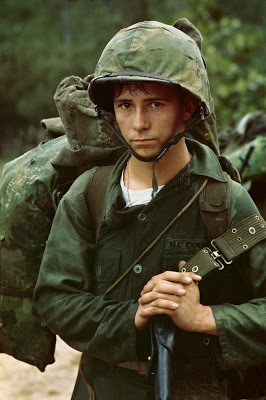
Did the Viet Nam War kill the innocence of our nation?

Today’s kids are three times more likely to aspire toward a career as a YouTuber rather than an astronaut, according to a new study.
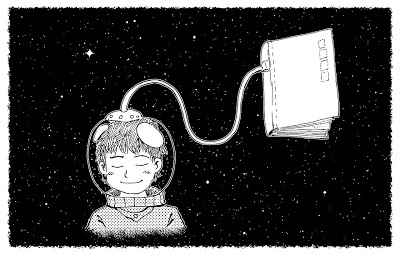
More than half of those in China said they wanted to be an astronaut, making it the most popular career aspiration.
To join in a venture which contributes to a noble cause that enriches their whole country.

Is it that here in America, young people would rather RECEIVE attention rather than GIVE it to others?

NASA confirmed that on July 25, Asteroid 2019 OK passed about 73,000 kilometers from Earth,
roughly one-fifth the distance to the moon.
This asteroid wasn’t one that scientists had been tracking,
and it had seemingly appeared from “out of nowhere.”

Astronomers have a nickname for the kind of space rock that just came so close to Earth:
“City-killer asteroids.”
If the asteroid had struck Earth, most of it would have probably reached the ground, resulting in devastating damage.

When The End comes (however it does)
wouldn't it be nice to be in the midst of Fighting the Good Fight rather than grasping for cyber-attention?

Is "LOOK AT ME" Attention Seeking the defining Need of our times?
Published on July 28, 2019 22:00
July 25, 2019
FACE-TO-FACE No More

"If Friends was created today, you would have a coffee shop full of people
that were just staring into iPhones," Jennifer Aniston recently said in an interview.

Growing up, I was always told to take responsibility for my actions
no matter how badly I wanted to avoid doing so.
I learned to deal with problems by speaking about them in person, and to form relationships face-to-face.
What my childhood did not prepare me for
was the impact technology would have on the way my generation communicates.
Has it become the norm to confront others through text message?
This is the age of the non-committal, unlabeled relationship.
People meet and add each other on Snapchat, Facebook, or whatever chosen platform
and proceed with minimal effort and maximum caution.
Are we so busy texting that we have forgotten how to talk meaningfully to one another?
Face-to-face communication seems to have become a lost art.
What Do You Think?
Are We So Connected
That We Are Alone?
Published on July 25, 2019 22:00
July 24, 2019
GHOST in the Night
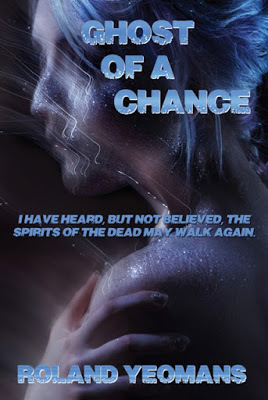
Before GHOST OF A CHANCE ...
https://www.amazon.com/dp/1534981861/
there was a
Ghost in the night.
It was that moment between waking and dream. I was sitting on my apartment terrace.
The night spoke to me in its velvet silence.
Owl happily was not speaking my name.

He perched on the cypress branch opposite me, studying me as I was admiring him.
Brother raccoon scurried in the bushes below, carrying some prize in his front right paw.
My ghost cat, Gypsy, twitched her tail on the window sill,
the mysteries of the ages whispering in her half-closed, green eyes.
My own eyes were heavy. Too many miles driven. Too few hours slept.
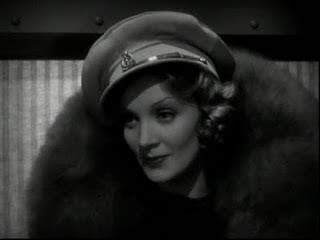
I put the period to the last sentence of my blog post about Marlene Dietrich with the troops in the front lines during WWII:
**
One afternoon after VE Day, she was walking through a little French village.
All around her was rubble, and she couldn't understand why --
all the buildings along the street were still standing with curtains blowing frilly and snapping clean-crisp in their windows.
Then, she looked through one of the windows to see that there was nothing behind it.
The fronts of the buildings were still standing, but everything behind them had been destroyed.
There wasn't a single living person past the false fronts of those caricature buildings.
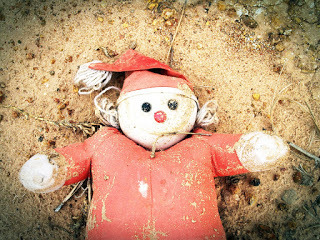
Only one lone doll lay forlorn in the rubbled middle of nothing.
With her face cupped in trembling hands, she stood in front of that window, weeping silently, refusing to be comforted ...
"... for there is no comfort for the dead," she whispered.
***
Beside me a husky voice intoned, "Keine Komfort für die Toten."
I went cold and still, sliding my eyes as far to the right as they could go without moving my head.
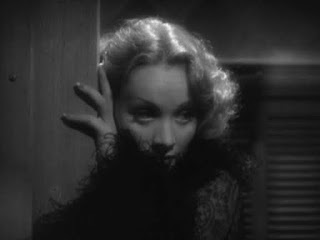 My mouth became salt.
My mouth became salt.Marlene Dietrich.
In a frilly black night wrap and not much else.
She was perched over the top of a wavering, insubstantial leather chair like a cougar ready to strike.
"You write so beautifully of me. Why?"
"Y-You were brave, selfless -- entertaining the troops on the front lines with a death sentence from Hitler on your head."
I cleared my fear-thick throat. "People have forgotten that."
She reached out and stroked my cheek with chill fingers of mist.
"It is not important for the world to remember me -- only that I did not forget myself when I was needed."
"And words like that are why I write of you."
Marlene fluffed my hair with ghost fingers. It tickled.
"Do you know what they call you in the ShadowLands, liebling?"
"N-No."
"Sänger von Träumen -- DreamSinger."
"I - I don't understand."
Her ice blue eyes hollowed. "One day you will."
In ghost whispers, she murmured, "Death and love."
"What?"
"I thought I knew them, liebchen. I was so sure. I died. Then, I saw life with new eyes."
She leaned forward, her eyes suddenly sparkling. "See you in your dreams, liebling."
And like a cloud robbing me of sunlight, Marlene was gone. I was alone. Well, not quite.
Gypsy was in my lap, yawning. It takes a lot to shake up a ghost cat.
***
Take a $6.99 cent chance on GHOST OF A CHANCE for Marlene, will you?
Published on July 24, 2019 22:00
July 23, 2019
Books Smell Like Old People
 "Books smell like old people"
- High School student in New Haven
"Books smell like old people"
- High School student in New Haven
There is an "Old Person" smell
( a grassy or greasy odor )
but books only carry it psychologically to young people.
{As the skin grows weaker, its natural oils become oxidized more quickly.
Fatty acids, which are secreted by the sebaceous glands, react to the oxygen in the air to form nonenal.
Because it isn't water soluble, nonenal can remain on the skin despite washing,
even remaining after intense scrubbing.
Therefore, the smell persists, even in extremely clean environments.}
Certain ingredients can also help combat nonenal, such as persimmon extract and Japanese green tea.
But let's get back to young people's attitude towards reading books
Teenagers, addicted as they are to texting and FB, probably read more words than ever ...
just in shorter, concentration- reducing, tidbits.
When they become twelve or thirteen, kids often stop reading seriously.
The boys veer off into sports or computer games,
the girls into friendship in all its wrenching mysteries and satisfactions of favor and exclusion.
Much of their social life, for boys as well as girls, is now conducted on smartphones,
where teenagers don’t have to confront one another.
Oh, the terror of eye contact!
A recent summary of studies cited by Common Sense Media indicates
that American teenagers are less likely to read “for fun” at seventeen than at thirteen.
I know that reading literature, history, science, and the rest of the liberal-arts canon
helps produce three-dimensional human beings.
Such beliefs defy trying to prove them with statistics.
Common sense is often not a matter of math but of logic.
But how is a taste for such reading created in the first place?
What Do You Think Of All This?
Published on July 23, 2019 22:00
July 18, 2019
WHAT MAKES A GOOD BOOK?
 Or what makes a book good?
Or what makes a book good?What is the criteria you use to gauge whether a book is worth the read?
Does a book have to be good to make a difference in someone’s life? Why or why not?
Victor Standish:
"For me, if it grabs my interest, makes me think, or helps me learn something then it is a good book."
Samuel McCord:
"A good book is a treasure trove of humanity so that no matter where you open a page and start reading, there is something new to be discovered."
Ada Byron, Lady Lovelace:
" I can more easily say why I don’t like certain books and to be honest, it is often the result of the author.
Of the most recent books that come to mind: one author I simply don’t like due to her style of writing and how her characters are always women who can’t take care of themselves."
So? What do you think makes for a good book?
Action. No action. Romance. No romance. A bit of both?
I believe there are some universal facets that make a book good and a good book (the two are sometimes not the same.)
1.) AN INTERESTING VOICE
If you don't connect to the voice, then no matter how spell-binding the plot, you will drift away from the book ...
that is if you even buy the book at all.
Why?
Because the Voice, like the wind in a ship's sails, is what carries you through the book's journey.
Like an aroma, it permeates each page, each word of the book.
The voice is what will make a page detailing even a train ride something memorable or witty or both.
2.) MEMORABLE CHARACTERS
The sparkling character of Tony Stark made IRON MAN. Hannibal Lector dominates each page he is on.
The characters in the world of Odd Thomas by Dean Koontz kept me turning the pages to meet more of his one-of-a-kind neighbors.
Memorable characters bring the story to life. They make you itch to get back to their banter when the world draws you away from their adventures.
In a way, they become friends you can come back to. They let us see and feel the world in a new way, expanding our minds, enriching our lives.
3.) A VIVID SETTING
It doesn't have to be a fantasy setting. No matter the genre, however, the world around the characters must feel "real."
Great settings "ground" the story. They highlight in the larger world, the tragic or comic elements in the smaller world of the lead characters.
Settings in good books become actual characters in the story either nourishing or preying, sometimes doing both.
After Katrina, New Orleans' streets killed the children/teens who roamed them. Their souls went before their lives.
Take 1895 Cairo:
the common man fared even worse. Their servitude was to multiple masters: taxes, poverty, landed aristrocrats, British prejudice. They were always in the crossfire of conflicting demands.
A well done setting breathes life into the story you are reading.
4.) A GRIPPING STORY
In essence, the plot has the reader asking, "What happens next?"
What is riveting to you may not be riveting to me.
But the bottom line to the gripping plot must be PERSONAL and PRIMAL to the reader.
The neighbor of a police detective has her baby kidnapped. The child is being returned to her one finger, one toe at a time. No ransom demand.
Did the cleaning lady see something she shouldn't have? Did she throw away the wrong thing? Or is it about the detective's past, something to punish him?
Whatever the plot, the reader is invested in it and is staying up longer than she should to see what happens next.
What do you think is essential in a good book?
Tonja Drecker wrote a review recently that my latest book was good -- which made my day.
The author creates a dark but beautiful and enticing atmosphere in the French Quarter.
The setting is placed on the first day of the Carnival in 1947, where reality, death and magic interplay and form a wondrous world.
Nuestra Señora de la Santa Muerte is portrayed with an exquisite, dark elegance as she leaves a trail of death in her wake. But that's only the beginning.
The characters are vivid with personalities so potent, they jump from the page—some even taken from well known figures like Cesar Romero.
The mystery is twined and twisted.
The addition of myth and magic add an alluring spice. It's a wonderful concoction which pulls in and presents a show all of its own. Add the well crafted wording and clever dialogue, and it's an intoxicating mix.
Why not go to my book's Amazon page
and try the LOOK INSIDE feature
and see if it interests you?
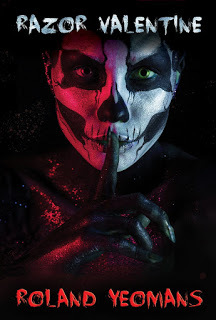 https://www.amazon.com/dp/B07N75DRKC
https://www.amazon.com/dp/B07N75DRKC
Published on July 18, 2019 22:00
July 17, 2019
THE MOST TERRIFYING MAN ELECTED PRESIDENT
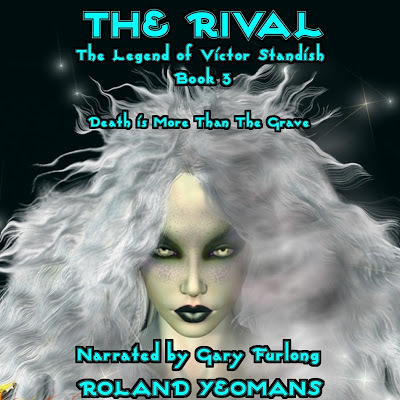 https://www.amazon.com/dp/B007JOUJ60 Only $1.99 Kindle or$7.49 Audio
https://www.amazon.com/dp/B007JOUJ60 Only $1.99 Kindle or$7.49 AudioI am a student of history, and in my historical fantasies,
I like to hurl my heroes against those in power who abused it.
In THE RIVAL,
I have Victor Standish and Sergeant Samuel McCord clash with President Jackson in 1834 New Orleans.
Was Jackson a villain?
Andrew Jackson was a wealthy slave owner and infamous Indian killer,
gaining the nickname ‘Sharp Knife’ from the Cherokee.
President Thomas Jefferson appointed him to appropriate Creek and Cherokee lands.
In his brutal military campaigns against Indians,
Andrew Jackson recommended that troops systematically kill Indian women and children
after massacres in order to complete the extermination.
The Creeks lost 23 million acres of land in southern Georgia and central Alabama,
paving the way for cotton plantation slavery.
His frontier warfare and subsequent ‘negotiations’
opened up much of the southeast U.S. to settler colonialism.
As a major general in 1818, Andrew Jackson invaded Spanish Florida chasing fugitive slaves
who had escaped with the intent of returning them to their “owners,”
and sparked the First Seminole War.
As president, Jackson's war with the banks sparked the financial panic of 1837.
I could go on, but there is a reason he is being taken off the $20 bill.
His ghost is probably happy since he hated paper money!
In keeping with Jackson tradition,
I have him duel with Victor Standish on horseback with sabers!
Also keeping with tradition, I have Jackson cheat.
Published on July 17, 2019 22:00
July 16, 2019
IS OUR CULTURE DECAYING?

Some days it is hard not to ask,
"Is our culture decaying?"
“The five marks of the Roman decaying culture:
Concern with displaying affluence instead of building wealth;
Obsession with sex and perversions of sex;
Art becomes freakish and sensationalistic instead of creative and original;
Widening disparity between very rich and very poor;
Increased demand to live off the state."
- Edward Gibbon
“Civilizations die from suicide, not by murder.”
- Alfred Joseph Toynbee
“Sick cultures show a complex of symptoms such as you have named...but a dying culture invariably exhibits personal rudeness. Bad manners.
Lack of consideration for others in minor matters. A loss of politeness, of gentle manners, is more significant than is a riot.”
- Robert Heinlein
“A decline in courage may be the most striking feature that an outside observer notices in the West today. The Western world has lost its civic courage.
- Aleksander Solshenitsyn
“Of the twenty-two civilizations that have appeared in history, nineteen of them collapsed when they reached the moral state the United States is in now."
- Alfred Joseph Toynbee
"The Nation that makes a great distinction between its scholars and its warriors will have its thinking done by cowards and its fighting done by fools.”
-Thucydides
"We killed Martin Luther King and now make an icon of Kanye West. Something is dreadfully wrong with this country."
- Lady Lovelace
WHAT DO YOU THINK?
Published on July 16, 2019 22:00
July 15, 2019
Once Upon A Time
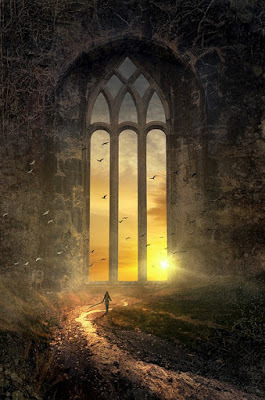
Once upon a time ...
there was a telegraph operator, Lester Dent, who worked the graveyard shift. One of his co-workers sold a story for $450
--which was a fortune at the time--
and Dent thought, "Hey, I could do that!"
Turned out he was right.
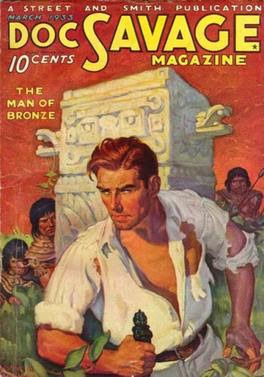
Dent eventually wrote over 159 novels over 16 years--and that was just the Doc Savage novels!
He celebrated his affluence by buying a yacht and sailing around the world.
He had a Master Formula to write a selling 6,000 word short story.
"There is a formula, a master plot, for any 6000 word pulp story.
It has worked on adventure, detective, western and war-air.
It tells exactly where to put everything.
It shows definitely just what must happen in each successive thousand words.
No yarn of mine written to the formula has yet failed to sell."
Here’s how it starts:
1. A DIFFERENT MURDER METHOD FOR VILLAIN TO USE
2. A DIFFERENT THING FOR VILLAIN TO BE SEEKING
3. A DIFFERENT LOCALE
4. A MENACE WHICH IS TO HANG LIKE A CLOUD OVER HERO
FIRST 1500 WORDS
1–First line, or as near thereto as possible, introduce the hero and swat him with a fistful of trouble.
Hint at a mystery, a menace or a problem to be solved–something the hero has to cope with.
2–The hero pitches in to cope with his fistful of trouble.
(He tries to fathom the mystery, defeat the menace, or solve the problem.)
3–Introduce ALL the other characters as soon as possible. Bring them on in action.
4–Hero’s efforts land him in an actual physical conflict near the end of the first 1500 words.
5–Near the end of first 1500 words, there is a complete surprise twist in the plot development.
The rest of the MASTER PLOT can be found here:
http://docsavage.org/2009/08/lester-dents-secret-master-plot/
Then, there are ROBERT HEINLEIN'S RULES FOR WRITING:
He said he sold every story he ever wrote so he might just have known what he was saying, right?
1. You must write .
2. You must finish what you start.
3. You must refrain from rewriting except to editorial order.
4. You must put it on the market
5. You must keep it on the market until sold.
Many writers have problems with #3.
But there are so many who write, re-write, and re-write until they wring the very life out of their prose.
WHAT DO YOU THINK?
A great tutorial on DIALOGUE
Published on July 15, 2019 22:00



